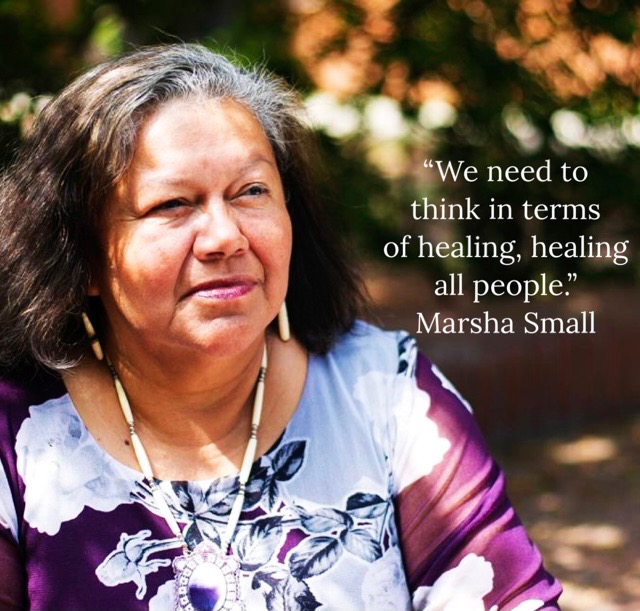As the public now decries the unmarked graves of Indigenous children of residential and boarding schools, many Native families are thinking, “We know. Finally, they’re paying attention!” After all the work that many Native communities and intellectuals/activists have been doing, people are noticing and condemning, unlike any time before, the terror and nightmare that Native families have been living with for generations. Secretary of Interior Deb Haaland, a boarding school descendant, recently announced the Federal Indian Boarding School Truth Initiative, which offers hope to affected communities, but also raises questions about the methods and approaches of this inquiry. Stories are surging on the outcry and accusations about boarding schools, sometimes without listening to the Native survivors, families, and communities that have already been speaking out and seeking truth, healing, and reconciliation in their own ways. For many that have experienced the horrors of boarding school first-hand, and to their children, these conversations trigger trauma.
Farina King and Marsha Small are two Native American scholars and descendants of boarding school survivors who are dedicated to serving their peoples by amplifying the voices of those who attended Indian boarding schools.
In her work, King addresses how Diné identity has changed among boarding school students through the twentieth century, and she addresses the physical affronts, illness, abuse, and punishment, and as well as survivor skills and creativity that students used to overcome their challenges at boarding schools.
Marsha Small, or O tata’veenova’e (Northern Cheyenne/Tsististah), has used geo-referencing systems such as ground penetrating radar (GPR) and geospatial information systems (GIS) to locate unknown and unmarked burial sites of the Chemawa Indian School Cemetery.
Listen to Farina King and Sarah Newcomb talk with Marsha Small for the Native Circles podcast.
We are part of a growing collaboration who address the intergenerational impacts of what historian David Wallace Adams defined as “education for extinction,” or schooling set to eradicate Indigenous sovereignty and being in the empire of the United States. We call for the Indigenizing of truth seeking and telling on the histories of boarding schools. Healing derives from self-determination and community-based approaches that center on living Indigenous communities and boarding school survivors and their families. The National Native American Boarding School Healing Coalition (NABS) has spearheaded this movement for truth and healing in the United States (https://boardingschoolhealing.org/).
As early as 1928, the Meriam Report uncovered many of the harms of Indian boarding schools, such that the federal government increasingly redirected their attention towards public schools for Native children. However, some boarding schools have remained open into the twenty-first century, though they have changed many of their most nefarious policies, many even embracing the teaching of Native American cultures and languages. Yet, struggles over educational sovereignty ensues as Native youth fight to protect their right to life and water at home.
The One Mind Youth Movement are Cheyenne River Sioux young leaders who are fighting to sustain Indigenous “outreach, community, and education” (https://www.omym.org/). Some Indigenous youth are fighting to wear ancestral regalia at their graduations such as Christian Titman of the Pit River Tribe who sued his school district in California for not allowing him to wear an eagle feather in his graduation cap in 2015.
The Navajo Nation is an example of one tribal nation that is attempting to reaffirm their authority over the education in public schools on their reservation.
Boarding school histories trigger guilt, both in those involved, as well as those looking on. Many now ask, what more could we have done to save the lives of these children?
King once asked her Diné father why he never taught her Diné bizaad, Navajo language, and he told her, “You never asked.” But she knows other Diné parents who no longer talk to their children in Navajo, and they openly admit that they thought that their language would hurt their prospects in the future. The schools drilled in them that Indigenous languages and cultures were impediments and vestiges of a losing and dying people. They believed that the trajectory of their children excluded Indigenous values, including sovereignty and peoplehood for which many of their ancestors sacrificed their lives. A relentless ailment that burdens the survivors of boarding schools and their posterity is the paradox that we will either forever belong to a race of victims, or we can reject our Indigeneity and side with “the winning team.” History is often framed as a game of winners and losers, but there are never winners in such histories of violence and rupture.
Indian boarding school truth-seekers must seek healing and recognize our Indigenous ancestors made the most of a difficult situation. They survived with the hope that their descendants would someday thrive. Uncovering buried truths will reopen the wounds that never fully healed, and the healing will be painful. This is not a process that can be rushed, or ripped apart, and it must involve those who are affected by the legacies of Indian boarding schools. Each grave uncovered represents a missing child, a stolen ancestor, and a family that never came to be. -Farina King, Ph.D.
PODCAST!
HERE








No comments:
Post a Comment
Please leave a comment.